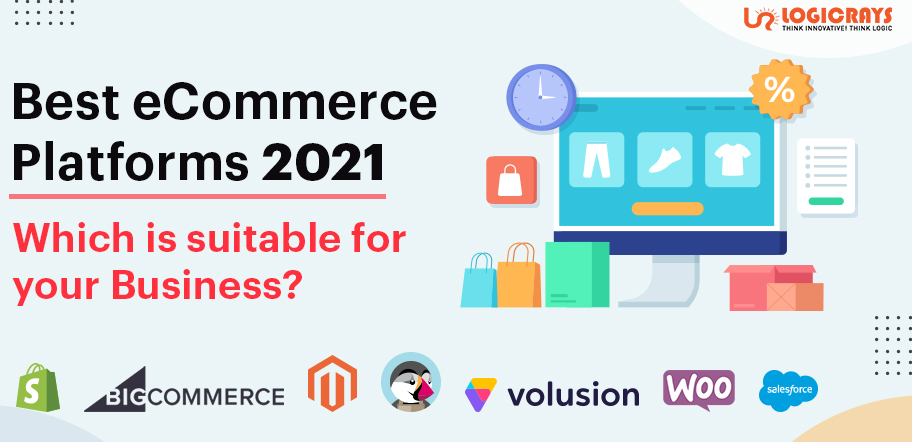When you decide to launch an eCommerce store, you’ll have to decide on the eCommerce platforms first. Among the multiple options available, you are most likely to select the one that satisfies your business requirements. It boils down to the key features of eCommerce platforms. eCommerce merchants are most concerned about the selection of technology before starting an online store. It includes validating key features of a particular technology, balancing with the business needs, costs, eCommerce Developers and more.
You might be looking to develop an online store for the first time, or may want to convert your current physical store into an online display or leverage your existing online store into a popular online shopping website. When you look at the technology front, it could be confusing when not knowing exact use cases.
Explore insights about eCommerce platforms starting with an understanding of available resources, their characteristics, frequent updates, support and maintenance criteria and other critical factors. This list of the best eCommerce platforms 2020 presents popular and useful eCommerce platforms suitable for your business needs.
Magento
Magento is an open-source platform to build customized online stores. It comes with free as well as a paid version for enterprise-level solutions. Its a huge tool to build your online business with a lot of functionalities, customization, bigger community support and everything eCommerce. If you want to build the fastest, scalable and enterprise-level eCommerce store, Magento is for you.
It works well with cloud storage, search engine optimization, products marketing and moe. Magento will never disappoint you in terms of providing best in class features, easy to develop functionalities, code reusability and website speed optimization. Also, it boasts the unlimited benefits of customer satisfaction features such as content management, unlimited products listing and more.
If you’re considering building a small business website and prefer not to invest time in developing an eCommerce site from scratch, you can explore readily available options like Shopify or BigCommerce. However, for those looking for tailored solutions, it’s advisable to hire Magento developers and leverage Magento development services to maximize your online store’s potential.
BigCommerce
BigCommerce is the direct competitor of Shopify and offers BigCommerce Development services to build affordable eCommerce websites. From startups to enterprise-level companies, businesses choose to build online stores with BigCommerce. Though it is not considered a full-featured eCommerce solution like Magento, it is undoubtedly one of the fastest tools to set up an online store.
BigCommerce has a particularly strong set of native features, while also maintaining a sizable app marketplace for optional add-ons (ballpark 600 in total). BigCommerce’s built-in features include:
The native features of BigCommerce include multiple facilitations for customers and give them a welcoming experience to the online store. It facilitates real-time shipping calculations, easy payment integrations, a checkout, support multiple product variants, single-page checkout and more.
Shopify
Shopify came up as the most handy tool when it comes to building super-fast online stores. It has the best marketplace, strong features and supports multiple categories of online stores. However, you may find limited functionalities when compared to bigger platforms like Magento.
eCommerce merchants find Shopify as their handy tool where they can easily add addons, extensions and integrate multiple payment gateways. Shopify is best known for its easy to use,
user friendly nature. The platform has got the Best Shopify Experts, awesome templates and quite interesting templates to use for unique online stores.
It is suitable to build a variety of stores including clothing, retail store, photography, kids store and more. Shopify does encourage the large-scale development in online websites and support multiple languages, currencies and payment gateways.
WooCommerce
WooCommerce is an eCommerce plugin for WordPress users. It is referred to as an eCommerce plugin but still giving competition to eCommerce platforms that are fully interactive. It has more than 80 million downloads and is among the world’s most popular eCommerce platforms. If you have a WordPress website and are looking to convert it into an eCommerce store, WooCommerce is the best bet.
Though it’s a completely free plugin, you can manage to purchase a few themes and templates for the user interface.
WooCommerce is developer friendly. Lets you build features out of ease and does not require programming skills. Business owners can easily take control of their website, manage the products catalogue and be free to use it. If you think of a seamless design and user friendly online store, WooCommerce is for you. It has got the best mobile friendly design, access to tracking the stock level, speed optimization, geolocation support and a lot more features that you would primarily want in your online store. All you need to have is a WordPress account and add WooCommerce plugin, activate the plugin and get started with the online portal.
Conclusion
Let us know in comments which do you think is a suitable eCommerce platform to your business requirement? Share what are your thoughts on the latest frameworks and their offerings? Also, check out the latest design trends, essential technology aspects in eCommerce websites and conferences. Checking out on what’s latest helps you outperform the competition of online businesses. Connect with us on Twitter for a detailed consultation on eCommerce technologies.
